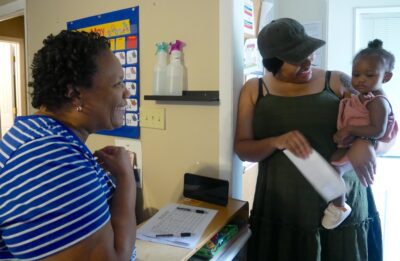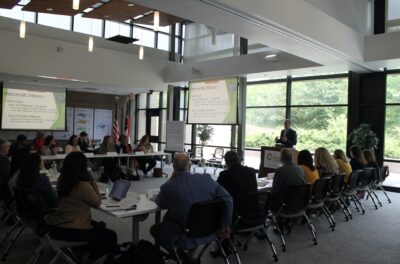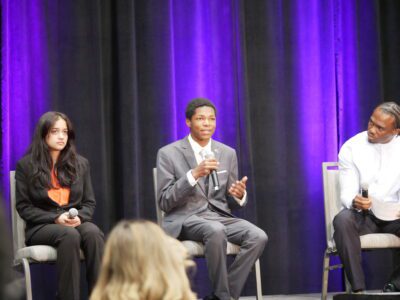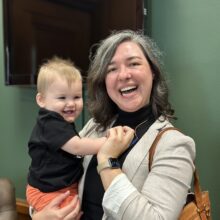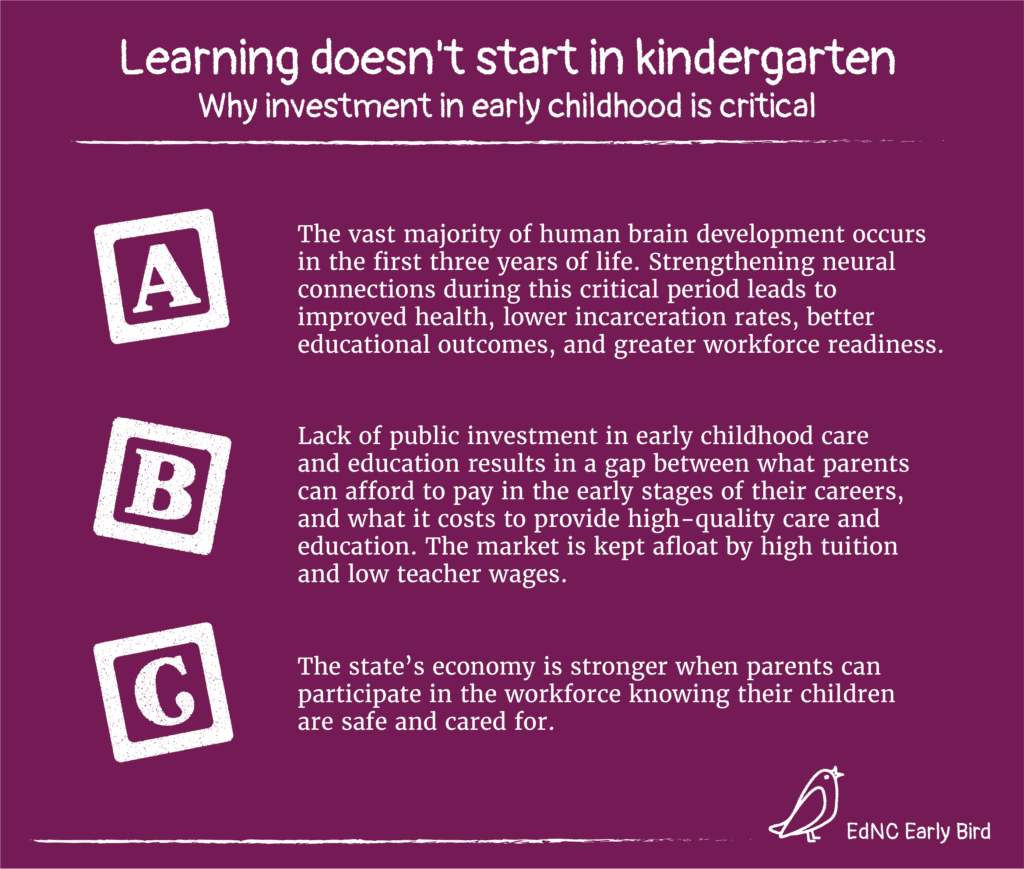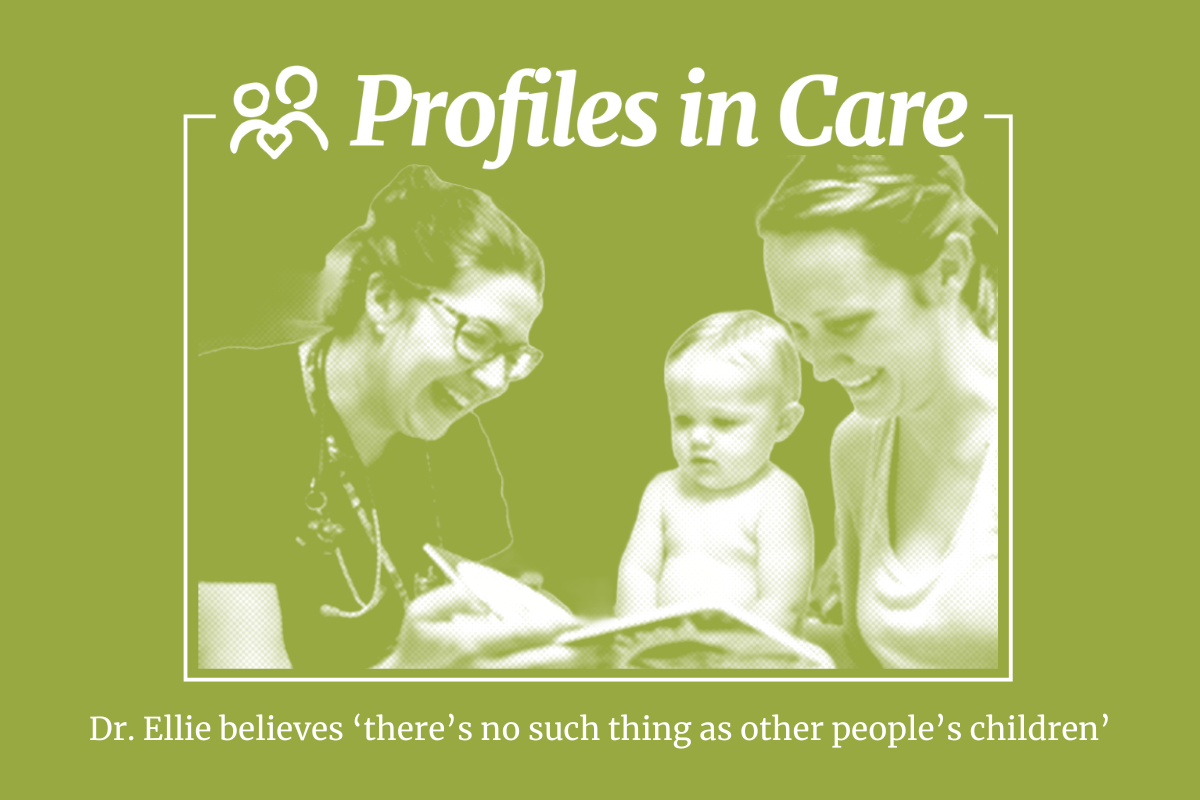
EdNC is highlighting the experiences of educators, families, researchers, and advocates with a stake in North Carolina’s early care and learning landscape. These profiles illustrate that care and education are inseparable, especially in a child’s first five years — caregivers educate, and educators care. In this series, we refer to those profiled in the way they are known by their community.
Dr. Elizabeth “Ellie” Erickson grew up in Manhattan, the only child of two book editors. She grew up surrounded by books, but in the summers she traded her bookish city life for one of sailing on the Pamlico Sound at Camp Seafarer on North Carolina’s coast.
After high school, she followed the path of some of her camp counselors, attending Davidson College, where she studied Spanish literature.
“I wrote a great thesis about Evita Perón’s autobiography, which no one will ever read,” Dr. Ellie quipped. “I wasn’t one of those kids who was always like, I want to be a doctor when I grow up.”
But a medical ethics course at Davidson got her thinking differently about medicine.
“These stories are cool. These questions are cool. Medicine and being a doctor is so much more than science,” Dr. Ellie told EdNC. “So I’ve always approached medicine from the humanities angle.”
Now, as a general pediatrician for Duke Health in Durham and an assistant professor of pediatrics at Duke University’s School of Medicine, she’s on a mission “to create communities that can hold families, so they can hold their kids.”
‘A baby and someone’
Dr. Ellie planned on pursuing a career in adolescent health after she completed medical school at Wake Forest University and residency at Duke Health. Instead, her first job landed her in a nursery — where newborn infants were having “their first day Earthside.”
That’s when things began to click for her.
“I was like, ‘Wait a minute, this is where the cool stories are.’ It’s like the beginning of a book,” she said. “But it’s not; it’s the middle of a book actually, because you have parents.”
She points to the work of D.W. Winnicott, an influential pediatrician in the 20th century, who said: “There’s no such thing as a baby. There is a baby and someone.”
Winnicott’s point hit home for Dr. Ellie when she became a parent herself.
“I describe it as going to Oz,” she said. “Suddenly the world is in Technicolor, and I’m like, ‘Wait, everyone’s just been out here doing this?’”
She couldn’t believe parents were managing to get showered and dressed, never mind going to work or the grocery store.
“The truth is, if we want to take care of the kids, we have to take care of their parents,” Dr. Ellie said.
The purpose of a well-child visit
One of the ways Dr. Ellie encourages her students to shift their focus from babies to whole families is by questioning the traditional role of pediatricians.
“We are so lucky to live in a time — for now — where we have vaccines and public health and most children aren’t dying,” Dr. Ellie said. “And so what is the purpose of a well-child visit?”
This question often stumps her residents, who are accustomed to thinking of their work as doctors in diagnostic, problem-solving terms. But Dr. Ellie tells them pediatricians do more than administer vaccines and complete growth charts.
“What we’re here for is relationships, right?” Dr. Ellie said. “So where is that part of it? And where is the part where we’re supporting parents and families in being as safe and stable as they can be, so they can safely hold their children?”
Dr. Ellie’s commitment to this approach came in part from her involvement with Reach Out and Read during her own residency.
Reach Out and Read is a national nonprofit with state and regional offices — including in North Carolina — with the mission to “strengthen all families with young children through guidance from medical clinicians about nurturing relationships through shared reading.”
“It was like a perfect marriage of my childhood full of books and my professional role,” Dr. Ellie said.
Originally she said she was just sending families home with books and statistics about the importance of reading, then patting herself on the back a little for a job well done. But then she saw how Perri Klass, national medical director of Reach Out and Read, did it.
“You start your clinic visit by handing the child a book, and you open the visit that way,” Dr. Ellie said. “You can learn all kinds of stuff by seeing how the kid interacts with the book.”
More Profiles in Care
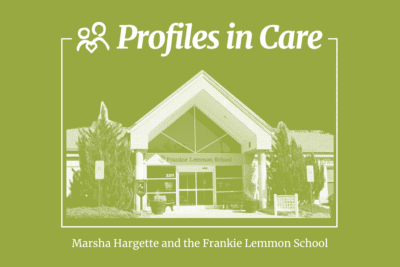
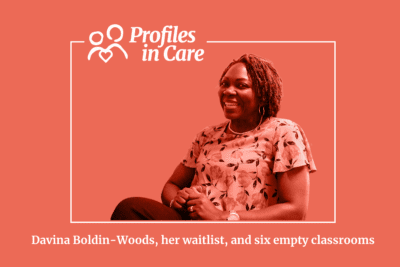
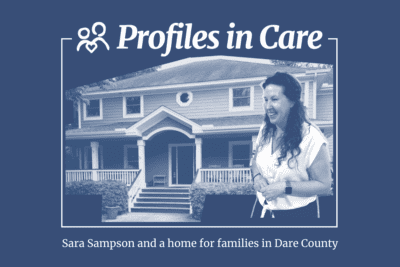
When she began her own visits this way, she saw that the magic of helping parents and caregivers build a practice of reading to their children wasn’t simply exposure to vocabulary; it was the bond formed between family members during that interaction.
“They’re learning better because their brains feel safe when they’re sitting with their parents, snuggled and reading, and there’s that visceral, tactile sensation of it,” Dr. Ellie said.
Now she runs Duke Health’s Reach Out and Read program, in addition to doing some work for the organization’s national office. And she advocates for this approach with other doctors.
She also serves as an ambassador for Mount Sinai’s Parenting Center, which is designed to integrate the science of early childhood development into pediatric healthcare. That includes videos for parents to help them prepare for well-child visits, and educational resources for residents and doctors.
Dr. Ellie said the most rewarding aspect of her work with young learners is “seeing young children and their caregivers delight in each other.”
When I’m seeing a 15-month-old in clinic and they’re terrified of me, and they’re like, I want nothing to do with you, absolutely not. And they’re clinging to their parent, their parents are going, ‘So sorry,’ and I’m like, ‘No, this is great. You are their safe space. You are their safe person. They feel safe with you. They feel secure with you. When I come closer, the kid freaks out, and when I back away they snuggle into you.’ …Being able to see that and encourage that is really rewarding.
‘And how are the children?’
The reason Dr. Ellie is so passionate about her work as a pediatrician, advocate, and a parent is because the earliest years of children’s lives make the biggest difference in their capacity to thrive over the course of their lives.
“Today’s children are tomorrow’s leaders,” she said. “That’s kind of a trite answer, but it’s true.”
She noted that in other societies, support for children and families is more than a talking point — it’s embedded in the culture. She gave the example of the traditional Massai greeting used in parts of Kenya and Tanzania: “And how are the children?”
When she thought about the answer to that question during her interview with EdNC, she became somber, in stark contrast to her otherwise sunny enthusiasm.
“There is a texture to some kids that I see now that’s just really socially, emotionally dysregulated,” Dr. Ellie said. “I think it just has to do a lot with lack of community, lack of connection, lack of social cohesiveness.”
![]() Sign up for Early Bird, our newsletter on all things early childhood.
Sign up for Early Bird, our newsletter on all things early childhood.
That’s why the work she does to help families nurture connections is so crucial to North Carolina’s future.
“Some of the things that we’re seeing, like the loneliness epidemic and the mental health crisis that everyone keeps talking about … so much of the seeds for this were planted in early childhood,” she said. “And not just in our children, but in their parents.”
She wants to see public policies that do more to make supporting children and families a reality — not a talking point.
“Include pediatricians at the table,” Dr. Ellie said. “Whenever you are talking about child health, look around the room and see if there’s a pediatrician there, and if there isn’t, ask yourself, why and how?”
“We all want what’s best for children, and children do not exist in a vacuum,” Dr. Ellie said. “And so policies that are going to support children are policies that support families and allow families to have capacity to care for their kids.”
Recommended reading
